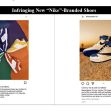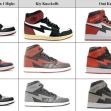Nike has filed a lawsuit against MSCHF, a Brooklyn Art Collective, after the release of Lil Nas X’s “Satan Shoe” this past weekend.
The rapper and MSCHF collaborated to release 666 pairs of the custom-designed Nike Air Max 97s amid the rapper's latest music video launch, Montero. The shoe pays homage to the music video which is centered around the rapper “falling” from heaven as he slides down a stripper pole into hell where he seductively dances with the devil.
The custom design shoe with a price tag of $1018 features an inverted cross, a pentagram on the laces, and the words “Luke 10:18" on the side. The shoe gained popularity before its release because of the single drop of human blood that is mixed in with the 2.03 fluid ounces of red fluid that are sealed in the cushioned midsole. The drops of blood in the shoes were allegedly donated by members of the art collective.
After the shoe “dropped” and sold out all 666 pairs in just under a minute, Nike filed its suit in the U.S. District Court for the Eastern District of New York. According to the complaint, Nike alleges federal trademark infringement.
Consumers Confuse Shoe as Nike Original
The sophisticated launch, marketing, and distribution of the shoe have led many to believe that Lil Nas X partnered with Nike in releasing his shoe. The backlash was felt almost immediately as many consumers threatened to boycott the brand because of the shoe’s satanic theme and the overall optics that Nike supports devil worshiping. Although Nike has tried to distance itself from the shoe, many are still left unconvinced. The blowback had a brief impact on Nike shares as they dipped to $131.52 on Tuesday.
Nike explains in the complaint, “MSCHF and its unauthorized Satan Shoes are likely to cause confusion and dilution and create an erroneous association between MSCHF’s products and Nike. In fact, there is already evidence of significant confusion and dilution occurring in the marketplace, including calls to boycott Nike in response to the launch of MSCHF’s Satan Shoes based on the mistaken belief that Nike has authorized or approved this product.”
The issue of intellectual property has been called into question because of the fine line between artists repurposing a copyrighted product to profit off their own creative intellect and overall trademark infringement with mass production. Unlike many artists who repurpose a single copyrighted product with their creative design, some argue that MSCHF crossed the line because it repurposed and distributed the Nike Air Max 97s at a large enough scale that it became indistinguishable from an original Nike product.
Although MSCHF drastically altered the look of the shoe, they sold the shoes with the iconic Nike "swoosh sign" still on them, leading to consumer confusion. The lawsuit explains, “In the short time since the announcement of the Satan Shoes, Nike has suffered significant harm to its goodwill, including among consumers who believe that Nike is endorsing satanism.” The complaint goes as far as including screenshots of consumer reactions to the shoe.
One consumer shared online, “This is sickening!!! How is Nike not involved when there’s a Nike symbol on the shoe!!!” Another comment reads, “You cannot say there is no agenda being pushed here. They could not make it more obvious. I might be done with Nike from now on.”
Nike insists, “MSCHF’s customized Satan Shoes, however, are not genuine Nike products. Nike did not manufacture or inspect the Satan Shoes, and Nike did not authorize MSCHF to make, promote, advertise, market, or sell the Satan Shoes.” Instead, Nike urges in the lawsuit that the shoes “constitutes new, unauthorized products.”
“Jesus Shoes” Raise Issue of Religious Discrimination
As the controversy surrounding the shoe continued to grow, some online commentators noted that MSCHF released a polar opposite “Jesus Shoe” in 2019. The Jesus Shoes were also designed using modified Nike Air Max 97s and were marketed as having holy water on the insoles. Roughly two dozen pairs were manufactured and sold at a $3,000 price point.
Sneaker fanatics and spectators alike noted that Nike did not have an issue with the release of the Jesus Shoes but had a vitriolic reaction to the release of the Satan Shoes. One Twitter user reflected, “Did Nike also sue over the Jesus shoes, or is this a targeted lawsuit against a religious minority?”
According to the lawsuit, Nike is suing for damages to its reputation that “money cannot compensate” along with the cost of the lawsuit and lawyer fees.






